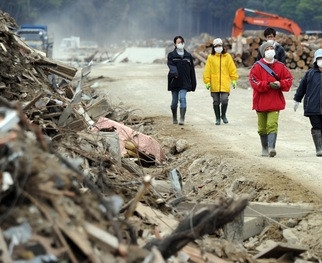
JEFFREY BROWN:And finally tonight: Japan two years after the massive earthquake and tsunami struck its northeastern coast.
Ray Suarez has the story.
RAY SUAREZ:The 2011 quake was one of the strongest in recorded history. It set off a tsunami that killed at least 16,000 people, left another 2,600 missing, and triggered meltdowns at a nuclear power plant.
Today, official records show over 300,000 people are still living in temporary housing.
For more on life in Japan two years after the disaster, I am joined by Yuki Tatsumi. She's a senior associate on U.S.-Japanese relations at the Stimson Center, a nonprofit, nonpartisan international research group. And she has just returned from Tokyo.
Yuki, welcome.
What are the observable effects of that earthquake in Japan two years later?
YUKI TATSUMI, Stimson Center: The answer depends on where you live, frankly.
If you live in the disaster-hit area, if you know anybody who were affected by the disaster, the disaster is still very much with you every day. People worry about radiation not only in their soil and the air, but also in the produce that they buy in grocery stores. But the further you move away from the affected area, you feel much, much less impact.
RAY SUAREZ:Well, you were just in Tokyo. There, is there a conscious feeling of still trying to cope with this disaster and rebuild the country?
YUKI TATSUMI:Yes. Yes and no, actually.
On the day of the earthquake anniversary, there were memorial services everywhere, including Tokyo. There was actually a big memorial service in Tokyo, where prime minister and emperor and empress attended, and gave a prayer to those who lost their lives.
And, at the same time, people in Tokyo at least live—go around and live their normal lives, but I wouldn't say as if nothing happened, because parents very much worry about the radiation that still could be carried in the air, worry about their children's health, and then also, like I said, in the food that may be still contaminated.
RAY SUAREZ:Well, we should talk a little bit about nuclear power. Because Japan has no significant natural resources to create energy, it's relied very heavily on nuclear power. And that nuclear power became a subject of great controversy after the power plant disaster that followed the tsunami.
What's the state of play now? Is Japan abandoning its stated desire to move away from nuclear energy?
YUKI TATSUMI:Well, the reaction you just describe it, exactly what happened in Tokyo—or in Japan, as I should say, in the immediate 12 months that followed.
The government at that time, partly because they were very much aware that they could not respond to the nuclear meltdown as well as they could have, so they went completely the other way and declared that the Japan will be a nuclear power plant-free country in some 20- to 25-year span.
However, since then, Japanese experienced two summers. And, as you may know, in Japan—Japan's summer, wherever you are, it's very humid, hot, much, much worse than the D.C. metropolitan area. People actually feel the power shortages and the implication of trying to reduce their dependence on nuclear power to—in a too soon, too short time span.
The current government has a little bit more balanced approach. They still do believe that Japan should reduce its dependence on nuclear power. However, they take a longer perspective of doing so. And they are intending to, I believe, invent—more resources into accelerating the—developing alternative energy to—eventually to replace the demand that is currently met by the nuclear power.
RAY SUAREZ:You mentioned radiation. You can't see it, you can't smell it, you can't taste it.
We did a story on this program that showed fruits and vegetables still setting off radiation detectors long after the power plant disaster. It must be a little unnerving to think that everything in your life might be contaminated.
YUKI TATSUMI:It's very unnerving, and especially if you're a mother with a small child. It's very unnerving.
There's really no solid scientific data that really can say anything definitively about the impact of the health in terms of how much radiation it can take in a contaminated—and so on and so forth. So, yes, it's still very unnerving. And in that sense, yes, the aftermath, aftereffect of the disaster is very much with Japanese.
RAY SUAREZ:There was a great deal of shock right after the tsunami and its aftereffects that more things didn't work better. Has this been a knock, now that we're two years away, to Japan's self-confidence?
YUKI TATSUMI:Right after the disaster, as you can imagine, everybody was completely shell-shocked. No one had ever imagined in their wildest dream that the disaster of that degree could happen, and to them.
And immediate—immediate reaction among the public was that, in some strange way, they rediscovered their inner strength, in terms of the way they were able to—kept their civility. As you remember, we really hardly heard any news about rioting, racketeering in the stores, none of that.
So, in a sense, at the public level, they rediscovered the self-confidence in themselves. But, at the same time, I think their confidence in the government very much were shaken by, like you said, the systems not working, the government not being able to respond to a nuclear meltdown as quickly, the government not being able to provide reliable information about the damage very quickly. So ...
RAY SUAREZ:And in the intervening months, of course, Japan has changed its government, changed its prime minister in—partially in reaction.
Yuki Tatsumi, thank you very much.
YUKI TATSUMI:Thank you.











